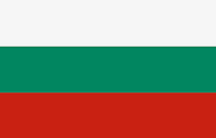- The official name of the country is Република България (Republika Bulgaria), translated as the Republic of Bulgaria.
- Government. Bulgaria is a parliamentary republic.
- History. Prehistoric cultures began developing in Bulgaria in the Neolithic period. The first Bulgarian Empire was established about 681 CE in the northeastern Balkan Mountains.
- Geography. Bulgaria borders five other countries: Romania to the north (mostly along the Danube River), Serbia and Macedonia to the west, Greece and Turkey to the south. The Black Sea is the border to the east.
- Roses. Roses have been cultivated in Bulgaria for centuries. The Rose Valley of Bulgaria produces 85% of the world's rose oil.
- Wine. Wine is an ancient part of Bulgaria's culture. Until 1990, exported Bulgarian wine was the world's second-largest total of bottled wine, and it continues to be ranked among the world's most prolific wine producers.
- Sports. Football (soccer) is the most popular sport in Bulgaria. The country excells at volleyball, tennis, gymnastics, track and field, and weightlifting.
- Sofia. The capital city of Bugaria, and its largest city, is Sofia with a population of more than 1.2 million (2017).
- Serdika. Sofia is one of the oldest cities in Europe and boasts many ancient sights from the time of the Thracians. The eastern gate of the Serdika Fortress (2000 BCE) can be found in the underpass between the Presidency and the Council of Ministers in Sofia.
- Roman Rotunda. Behind the Sheraton Hotel in Sofia is the Roman Rotunda or St. George Chruch. It is the oldest preserved structure which still serves its original purpose in the Sofia city.
- Rila Monastery. The Rila Monastery is a UNESCO site & example of Bulgarian Renaissance. It was founded in the 10th century by St John of Rila, a hermit canonized by the Orthodox Church.
- The Bulgarian Black Sea coast has 378 km of shoreline with 70 beaches, many bays, picturesque estuaries, clean sand, and dense forests.
- Veliko Tarnovo was the medieval capital of Bulgaria, with more than 7000 years of history. The houses, stacked one above the other, with narrow and winding cobblestone streets and alleys, are situated on the hills above the Yantra River. Tsarevets Fortress is displayed in a spectacular light show at night.
- Gabrovo. The citizens of Gabrovo are known for being frugal. At the hint of a crisis their sense of humor kicks in. Located in the town is the Museum House of Humor and Satire.
- Economy. Bulgaria is attracting large amounts of American and European investment.
- Traditionally Bulgarians shake their heads for ‘yes’ and nod for ‘no’, although nowadays this may be inconsistntly adhered to in the major cities.
- When Germany ordered Bulgaria to surrender its 50,000 Jews during World War II, the Bulgarian people refused, saving nearly all of them from deportation and death.
- Baba Marta Day. March 1st is Baba Marta Den (Granny March Day) in Bulgaria. Martenitsi ("tassles", ususally of red and white thread) are made on this day and given to friends and family to wear, and hung on trees and animals, to welcome the coming Spring.
FRUA is a service-marked acronym of Families for Russian and Ukrainian Adoption in use since 1994. It and the full organizational name,
Families for Russian and Ukrainian Adoption, are not to be used to describe any organization or service not related to FRUA, without permission.
Families for Russian and Ukrainian Adoption, are not to be used to describe any organization or service not related to FRUA, without permission.
© 2023 Families for Russian and Ukrainian Adoption Including Neighboring Countries






